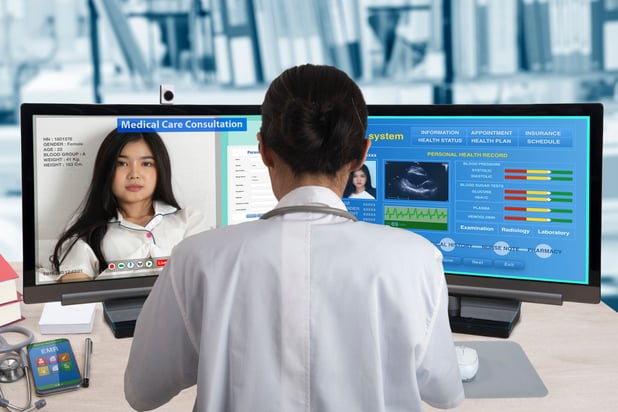Advancements in telemedicine have made access to certain healthcare services easier than ever, including clinical services for recovering substance abusers.
According to Chiron Health, telemedicine allows patients to receive clinical services without physically having to visit a hospital or physician's office. This innovative breakthrough is feasible through the use of software and electronic communications, both of which provide treatment that is more accessible than traditional methods.
Today, clinical services can be provided through various telemedicine mediums, including eHealth (health services provided online) and mHealth (healthcare apps for smartphones, tablets, and laptops).
What Services Does Telemedicine Provide?
Telemedicine offers an array of benefits to patients, as well as healthcare providers. The most obvious advantage of using telemedicine is communicating with medical professionals without the hassle of an in-person visit. However, that’s just one of the many benefits available thanks to this new wave approach to healthcare.
This includes the following services:
- Online patient portal — to communicate with a primary care physician and other healthcare providers
- Virtual appointments — appointments can be scheduled (reminders can also be scheduled)
- Review changes — review test results and updates from previous visits
- Medication — request prescription refills when necessary
For patients, the lines of communication have been exponentially opened thanks to advances in telemedicine.
Telemedicine for Addiction Treatment
With the healthcare industry integrating technological advances into everyday practices, check-ups can now be conducted remotely rather than in-person. This is especially beneficial for patients struggling with substance abuse.
Most people recovering from addiction do so by receiving treatment at a clinical facility, attending recovery meetings, or entering rehab. With the advent of telemedicine, recovering addicts now have more opportunities to connect with and receive support from specialists and other medical professionals.
According to Science Daily, “Experts have deemed telemedicine to be one way to improve access to substance use disorder treatment, particularly for people in remote and underserved communities.” This statement is true, specifically when referring to underserved communities, including those with high populations of substance abusers.
The Maryland Department of Health reported a 14.8 percent increase in fatal opioid overdoses dating from 2017 to the first half of 2018. Though a majority of these fatalities were reported in inner-city areas such as Baltimore, rural areas of Maryland have also been devastated by the opioid epidemic. Furthermore, medications used to treat patients addicted to opioids such as buprenorphine isn’t readily available in rural areas. Through telemedicine, physicians at the University of Maryland Medical Center’s (UMMC) Outpatient Addiction Treatment Service are now able to conduct video consultations and collaborate with local medical professionals to prescribe buprenorphine to patients in rural areas.
Recovering addicts also benefit from other telemedicine services. For instance, Utah-based Intermountain Healthcare, a not-for-profit system of 23 hospitals with 10 rural locations, offers a Tele-ICU program. The Tele-ICU program, which is a collaboration between rural doctors and doctors in Salt Lake City, offers intensive care for adults and newborn babies.
According to TechRepublic, the efforts of the doctors in this program have “reduced death rates in intensive care units and helped patients go home sooner.” This is due largely in part because increased accessibility to healthcare can help patients manage chronic conditions, including withdrawal symptoms. As such, the FDA approved a mobile health device designed to relieve opioid withdrawal symptoms.
Is Telemedicine Right for You?
When recovering from addiction, every second is crucial. Thus, having on-demand access to support can be of great assistance during recovery.
Despite these advancements, patients with substance issues are still advised to seek face-to-face treatment, such as in-person clinic appointments or attending recovery meetings. These suggestions are intended to prevent recovering addicts from isolating themselves during recovery, as isolation may lead to a relapse. Therefore, meeting with a physician to discuss telemedicine options can help addicts prepare for this new wave treatment and develop a plan for their recovery.
With these resources, treatment is available to us at our demand. More and more patients are beginning to utilize telemedicine, including individuals with substance abuse problems. As a result, recovering addicts can now reap the benefits of open lines of communication, as well as a variety of other services. Telemedicine can also cut costs for recovering addicts since patients don’t have to take time off from work or incur travel expenses to attend an in-person appointment.
This technological method of healthcare is secure and permits both patients and medical professionals to schedule appointments, request prescription refills and review any changes from previous visits. Telemedicine is truly innovative and provides hope for both active and recovering addicts alike.
As the healthcare industry continues to embrace technological advancements, receiving care from a medical professional can happen with just a few clicks on a computer or laptop (or swipes on a phone or tablet).
|
If you or someone you know is seeking help from addiction, please visit our directory of treatment centers or call 800-891-8171 to speak to a treatment specialist. |








